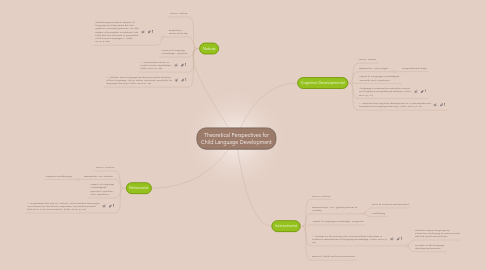Theoretical Perspectives for Child Language Development
par Jessica Fernandez


1. Nativist
1.1. Focus: Nature
1.2. Researcher: Noam Chomsky
1.2.1. identified grammatical aspects of language and described the rule systems--universal grammar--"as 'the system of principles, conditions, and rules that are elements or properties of all human languages'” (Otto, 2010, p. 28)
1.3. Aspect of Language Knowledge: Syntactic
1.4. "...emphasizes inborn or innate human capabilities" (Otto, 2010, p. 28)
1.5. "...children learn language by discovering the structure of their language.. by an inborn mechnism specifially for language learning" (Otto, 2010, p. 29)
2. Behaviorist
2.1. Focus: Nurture
2.2. Researcher: B.F. Skinner
2.2.1. Operant Conditioning
2.3. Aspect of Language Knowledge(s): Symantic, Syntactic, and Morphemic
2.4. "...emphasizes the role of “nurture” and considers learning to occur based on the stimuli, responses, and reinforcements that occur in the environment" (Otto, 2010, p. 32)
3. Cognitive Developmental
3.1. Focus: Nature
3.2. Researcher: Jean Piaget
3.2.1. Preoperational Stage
3.3. Aspect of Language Knowledge(s): Semantic and Morphemic
3.4. "language is acquired as maturation occurs and cognitive competencies develop" (Otto, 2010, p. 31)
3.5. "...assumes that cognitive development is a 'prerequisite and foundation for language learning'" (Otto, 2010, p. 31)
4. Interactionist
4.1. Focus: Nurture
4.2. Researcher(s): Lev Vygotsky, Bruner, & Halliday
4.2.1. Zone of Proximal Develpoment
4.2.2. Scaffolding
4.3. Aspect of Language Knowledge: Pragmatic
4.4. "...focuses on the primary role of sociocultural interaction in children's development of language knowledge" (Otto, 2010, p. 33)
4.4.1. Children acquire language by interaction and trying to communicate with the world around them
4.4.2. Focuses on the language development process
